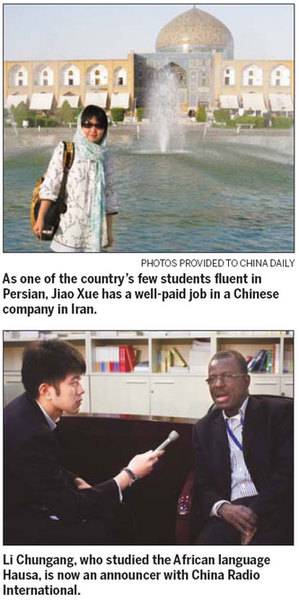Society
One in a million
Updated: 2011-03-25 08:12
By Tiffany Tan (China Daily)

Speaking a 'less commonly taught language' in China can be a fast track to high earnings and promotion, Tiffany Tan discovers.
For someone who describes herself as "lazy", Jiao Xue is doing rather well in her career. The 26-year-old is an assistant manager in the Teheran office of Citic Construction, a State-controlled enterprise with infrastructure projects in Iran.
As an expatriate employee, Jiao makes the equivalent of 13,100 yuan ($2,000) a month, three to four times what she would earn on the Chinese mainland.
Her company also provides her two free round-trip airline tickets back home a year, free room and board plus medical insurance. After three years with Citic in Iran, Jiao says she is assured of a promotion when she returns to China.
In a country where 9.3 percent, or 5.9 million, of last year's college graduates are still scrambling to find work, Jiao didn't lift a finger to land a job.
"The job found me," says Jiao, from Shenyang, Liaoning province, "because I studied Persian."
 |
In 2007, Jiao was among 10 students to graduate with a bachelor's degree in Persian language from Shanghai International Studies University.
Three years later she obtained a master's degree in Persian literature from Peking University, the only person in a country of 1.3 billion people to do so that year.
Persian, or Farsi, the official language of Iran, is classified as a "less commonly taught language" in Chinese universities. It belongs in the same category as languages like Hebrew, Sanskrit, Urdu, Filipino, Swahili and Polish.
During the early decades of the People's Republic of China, these academic programs ensured China a steady supply of talent to help promote foreign relations.
"From the 1950s to maybe the end of the 1970s, the government took care of your job after you graduated from university," says Dr Wu Jiewei, dean of Peking University's department of Southeast Asian studies, which offers less commonly taught languages.
"At that time many of the alumni went to the Foreign Affairs Ministry because according to (former) premier Zhou (Enlai) knowing their native language would help us improve our relationship with other countries."
Now graduates can freely choose where to work. Some join the corporate world, where they become crucial to their employer's expansion plans overseas.
"When will you have your next graduate?" is a question Wu regularly gets from Chinese as well as foreign companies in China, since less commonly taught language programs only produce graduates every three or four years.
"If they know that we have a student graduating this year, they make a plan that this year or the next, they will expand their business in this particular country.
"When I explained this to the students and their parents, they couldn't believe it. They couldn't understand it," Wu says.
"If you study well enough, and I just mean enough, you don't even have to be the best, you don't need to think about your job. The job will look for you."
Ease of finding a job is how university administrators market less commonly taught languages to skeptical high school students.
Li Chungang, who studied the African language Hausa at Beijing Foreign Studies University, was once one of those students.
"My first choice was Spanish, but the school assigned me to study this African language," says Li, 24, a native of Daqing, Heilongjiang province. "I was a bit upset because all I knew of Africa at the time were the famines and wars shown on television."
Now Li couldn't be happier with the academic path he was given. Being fluent in Hausa, the most important indigenous lingua franca in West and Central Africa, has landed him in the announcer's booth at China Radio International (CRI). Since 2008 he has been hosting a weekly Hausa talk show as well as writing and translating content for broadcast.
And he has bigger dreams ahead: to become a television correspondent in Nigeria, where he hopes to become the most popular foreigner to speak Hausa.
"I want to be famous in Nigeria," Li says. "Every day you broadcast on TV and when people turn on the television they will say, 'Oh, who is this guy? Oh my God, he is speaking our native language! Amazing, amazing, amazing!'"
Specials

Tea-ing up
More turning to Chinese tea for investment opportunities like vintage wine

A cut above
The ancient city of Luoyang is home to a treasure trove of cultural wonders.

Rise and shine
The Chinese solar energy industry is heating up following recent setbacks in the nuclear sector